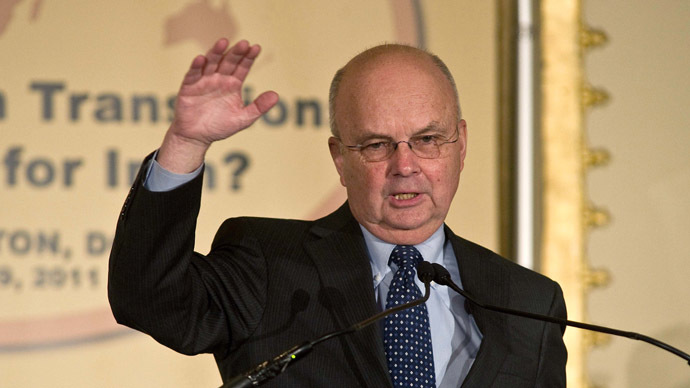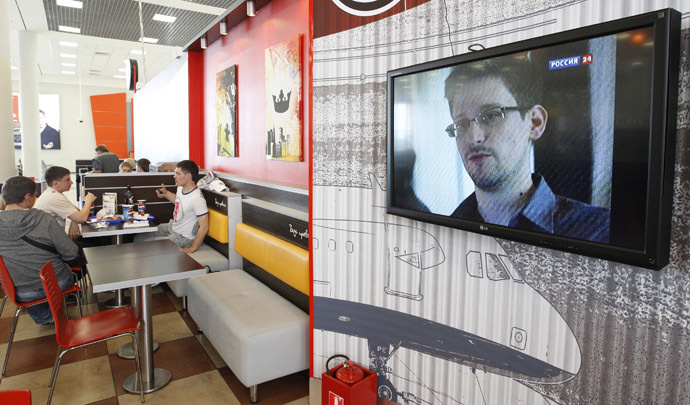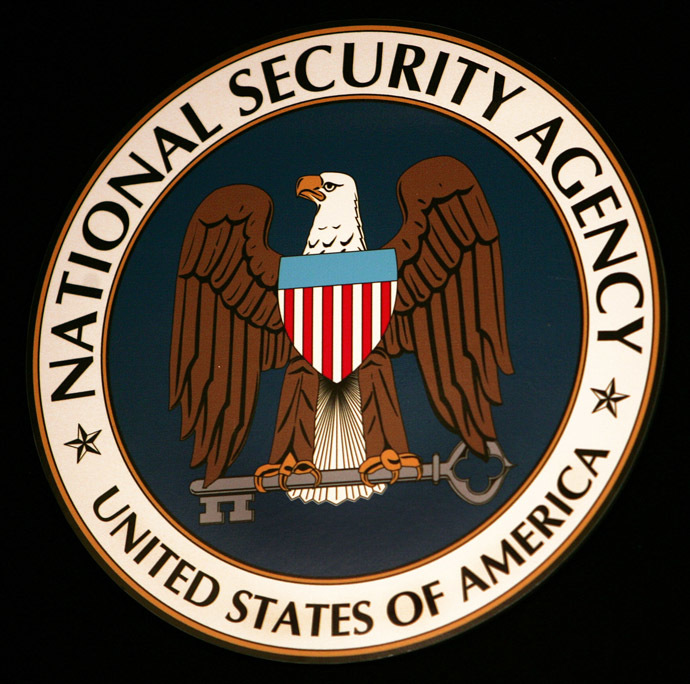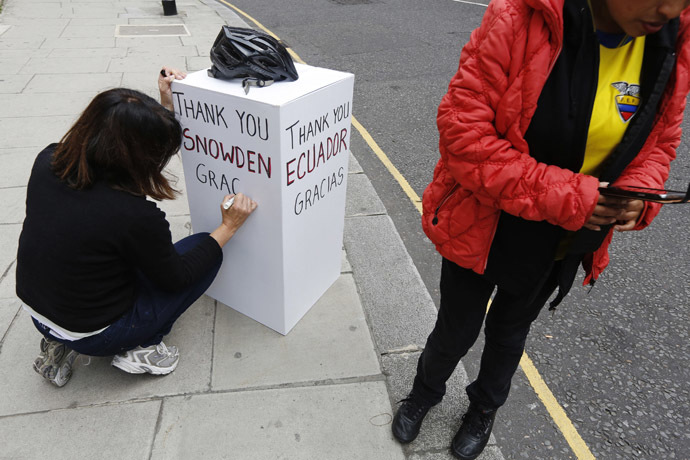NSA surveillance programs approved by two presidents, Congress, courts and will go forward – ex-NSA head

NSA programs revealed by Edward Snowden will continue as they are “lawful, appropriate, and effective” and the US people’s representatives voted in favor of them, former NSA and CIA director Michael Hayden said on RT's SophieCo.
RT:In your opinion, is Snowden a hero or a traitor?
Michael Hayden: Well, he certainly is not a hero. I don’t think he meets the legal definition of being a ‘traitor’ according to our Constitution. But he certainly has done a very, very bad thing and I think he is also a very troubled young man. So perhaps the truth lies somewhere in between the two extremes you’ve pointed out.
RT:Do you think he could be a Chinese spy agent? Dick Cheney seems to think so?
MH: I don’t have evidence of it. It’s a curious thing. Why
would he go to Hong Kong for his refuge while other places are
available that he could have chosen, and given the state of the
Sino-American relations, particularly when it comes to things
about the cyber domain, it’s really was a curious choice. But
again, no evidence to date. I tell you how I would handle it
while still in government. I would make this one of my working
hypotheses - one, not all of my working hypotheses - and then try
to seek out evidence that proves or disproves the
hypothesis.
RT:You were the head of NSA and CIA. What happens when
a young colleague of yours, a talented good guy, walks into your
office and tells you “Boss, I think we have the problem with
PRISM.” What do you say to that?
MH: Actually, that is a great question. What makes all of this so troubling is that Mr. Snowden didn’t do that. If he wants to be a true whistleblower, you need to go to a supervisor, the supervisor’s boss or the General Counsel inside the organization or the Inspector General or even to members of Congress to express his complaints. There is a clear structure within the US Government to do that.
Now look. I’ll be the first to admit that requires great courage
and human beings being human beings - there might be some of them
who would attempt to take retribution against an officer who
attempted to do that. But that’s the right way to do these
things. When somebody comes to you with a concern, certainly,
it’s the truth for me. You’ve got to take those concerns very
seriously. This is somebody acting out of conscience and you need
to sit down and talk with that individual and if necessary follow
up to see if the concerns actually have real merit.
RT:I remember back in 2007 there were also cases of whistleblowing when you were the head of NSA. Did these men address you with their concerns before they went public with their information?
MH: I had actually left NSA by 2005 and so those events of
2007 and 2008 came after I’d left. I’ve no knowledge of that
other than complaining about some technological decisions that
were made inside NSA, I’ve no knowledge that anything akin to an
appropriate whistleblower process had begun at the agency.
RT:General Hayden, with a secrecy breach like this, a
disaster basically, what’s going on inside the NSA and CIA right
now? You should know as somebody who’s being responsible for
this. What are you going to do when the major crisis exposes
you?
MH: What you’re looking for is responsibility, not
necessarily guilt. You want people to be open to you, you want a
clear description with regard to what has happened until you’ve
got the individuals to learn, to create lessons that allow you to
prevent or at least reduce the possibilities that these kinds of
things could happen in the future. And so you’re doing a lot of
forensics to the system, you’re talking to people who knew this
young man. What kind of things did his action suggest about him?
You’re talking to a supervisor. What did you suspect about him?
Did this surprise you? Did you see any kind of indicators? And
then you are also doing a damage assessment.
Let me list for you three different lanes in which damages almost certainly occurred. Number one - it tells our adversaries our capabilities. It tells them what we can do and also tells them what we won’t do - and that can be very damaging. Secondly, this will punish American firms who have cooperated with NSA. Punish them, even though all they have ever done is simply obey American law and help defend the United States. Then finally, if there is anyone else out there in the world, another government or potential source who might want to have cooperated with the United States, why would they trust us when we promise that we can keep a secret. So all those things are damaging.

RT:You brought up firms. From your own experience have social media companies any choice other than to obey NSA orders?
MH: Again, I’m not a part of NSA for a long time now. But my understanding of the program is that these companies, these private concerns were responding to specific court orders and under US law they can fight those orders in court, some have done that. I don’t know the results of any of these contentious cases, but my suspicion is they won some and they lose some.
RT:But if they’re doing everything that is legal, why are you saying they’ll be punished?
MH: Because these are international firms. And although acting very consistently with the American law, there’ll be others in the world who’ll look at them with suspicion. And certainly, from my point of view, unwanted suspicion. That’s what’s going to happen.
RT: What’s happening to the programs like the ones Snowden made public, this PRISM data collecting tool? Are they being wrapped up right now or is the NSA going to go ahead with it, in your opinion?
MH: I would see no reason why either of the programs that
he revealed, the metadata program or the PRISM program, why they
would be stopped. They’re lawful, they’re appropriate, they’re
effective. But the effectiveness may be the element that is most
harmed by these revelations. Again, adversaries now know what we
can do and also know what we won’t do - the boundaries of
American law and policy. And that gives them a higher probability
that they’ll be able to protect their communications from United
States agencies trying to intercept them.
RT:Though the PRISM is huge and it has turned America into a database platform for all its access to Facebook, Google, Yahoo, Microsoft, I mean it missed Tsarnaevs’ [the brothers who allegedly organized two explosions at the Boston Marathon] online activity prior to the Boston bombing. Are you maybe casting a net too wide?
MH: Actually the Tsarnaevs were not detected by any program like this because PRISM isn’t suitable for detecting the kind of communication that Tsarnaev brothers had prior to the Boston bombing. I mean PRISM is about foreigners. It requires a belief on the part of the National Security Agency that those people we want to monitor are foreigners and have foreign intelligence value. We’ve got to prove in broad terms to an American court before we can insist that one of these companies assist us in their effort.
RT:President Obama has claimed surveillance programs have stopped 50 attacks. But since these programs began operating shortly after 9/11 how many terrorist attacks were prevented solely by information gathered from these PRISM-like programs that could not be gained through any other source?

MH: Right. That’s a great question and I don’t want to be indirect with my answer, but I’m going to be indirect. I don’t know whether it is a correct answer to your question how many have been prevented only to the efforts of these two programs. In actuality, I cannot point to any program very often that is the sole reason that we have the intelligence success. One of the great achievements of the American intelligence in the past dozen years is that we’ve been able to blend multiple streams of information with a little bit sub-data here and a little bit sub-data there. That we’ve been able to combine into a meaningful picture. In other words we’ve been able to pick up shards of glass that individually have no meaning, but because we have a collectively large number of shards, we can actually combine them into a very meaningful mosaic.
RT:I’ve got another quote from Snowden: “The consent of the governed is not consent if it’s not informed.” I think it’s frank to say that a lot of people feel uncomfortable after these leaks, because it’s seems like you break into my home, you listen to my phone calls, you intercept my emails, my private SMSs without telling me you’re doing it. And you’re labeling all that as “war on terror”. I mean, can you really not fight war on terror and protect privacy, my privacy?
MH: Well, I think the president was right when he said the
responsible government has to make choices. You can’t have
absolute privacy and absolute security, there always has to be a
balance between the two. The balance, frankly, is based upon the
totality of its circumstances: what is the nature of the threat?
How real is that threat? How imminent is that threat? How
effective is this tool in detecting that threat? I think I agree
with the president. This is the suitable balance. Now I should
point out that some of the things you’ve said Americans are
saying, are simply errors of fact. We aren’t doing many of those
things.
Unfortunately, here in the US, when these kinds of stories get out into the public domain, I am fond of saying, they are rushed into the darkest corner of the room as rapidly as possible. So what is the important thing is to make sure that the American people exactly understand what we’re doing. Now to go back to Snowden’s quote about the concern of the governed - this is not ancient Athens. This isn’t a direct democracy where we allow the entire population to vote on every proposition. We are representative democracy. The people’s representatives were informed of these programs and they voted in favor of them. They’ve been approved by two presidents, they’ve been approved by the American court system. In the American system, at the executive branch, the legislative branch and the judicial branch lying out, it doesn’t get any better than that in terms of concern of the governed.
RT:I mean, the security is not really state religion that cannot be questioned, and if you question it, than you’re not loyal. Now you’re saying that that the PRISM hasn’t spied on Americans?It hasn’t gone into private emails?
MH: No. The predicate for PRISM is that the target of the surveillance is a foreigner and what’s happened is that story has been confused with the metadata story, which is indeed about Americans, but it’s about American phone records, not American conversations or communications.
RT:What exactly does it tell you about your system when your own people blow the whistle on you? Because it’s not the first time.
MH: No, it’s not. I mentioned before that I believe Mr.
Snowden was not a hero, he had committed a crime. But he was also
a troubled young man, let me phrase it for you this way: What
kind of moral arrogance is required to believe your personal
moral judgment trumps that of two presidents, two houses of our
Congress, the American courts and over 30,000 of your coworkers.
I would admit in American society, as in Russian society, we have
a generation of young folks whose kind of absolute commitment to
transparency which is well beyond anything of my generation and
even my children’s generation. We’re now, like the Russian
security services or any security service throughout the world,
recruiting from populations whose views toward secrecy and
openness are a bit different than those that have been
traditionally held by the people we have recruited in a former
age. So you’ve got Mr. Snowden, you’ve got Private Manning, both
of whom have an almost romantic attachment to revealing secrets.
But in both cases this commitment to absolute transparency has
created great harm to the security of people around the world.

RT:If not whistleblowers, who else can stop you in case you push it too far? There must be checks and balances everywhere, right?
MH: You’re right. There is a tactical point for you. A whistleblower has to point out unlawful activity. Even Snowden admits this wasn’t unlawful. He claims that it was unwise, it was inconsistent with his personal value system, but no one claims it was unlawful, it was consistent with law. It was done under the record order with the knowledge of the Congress. And it’s hard for me to imagine that anyone would afford him whistleblower status, at least in the technical, legal definition of the term. Now, where do you get debate? You get debate in our Representative Government. You get debate from a judge who pushes back saying he is uncomfortable with the outlines of the court order we want him to sign. You get debate in the American Congress, where members, particularly at the intelligence oversight committees, get a chance to look at these programs and to pass on their merits of the as to whether or not they would authorized them or appropriate funds for them.
RT:Are you really saying that giving all the details of my private life to a government agency is the new normal, a new patriotic norm?
MH: No, no, not at all. And again what you’re saying, that’s a reflection as to how badly-reported this story has been. The details of your private life are not being shared with the government. These two programs that the government gets is a macro database of phone calls that just fact of call, nothing more. With regard to the PRISM program, as I’ve already said, it focuses on foreign communications of intelligence value to the United States. That’s what the National Security Agency might add, what the FSB [Russia’s security agency] is all about.
RT:The whole thing is that may be if the Security State was a little more transparent - like Obama promised before he was elected president, then maybe the American public and the foreigners would be more comfortable with programs like PRISM.
MH: You bring up a wonderful point. Somebody with my background, coming from the security services - we’re reluctant to say much about anything. We actually think we’re more operationally effective the less our adversaries know about what it is we’re doing. But we also realize we work in a democracy. I’m now fond of saying that in the American democracy the president probably gets to do anything one-off, one time based upon his presidential authority and a narrow definition that it’s simply lawful. But in our system the president doesn’t get to do anything over a long period of time without generalized popular support, and you’re right, you don’t get generalized popular support unless the American people, and especially their representatives, have some sense of broad knowledge, maybe not detailed, but broad knowledge about what their government is doing on their behalf.
I now have to admit, even as a security professional, that we may have to make these things more public – things that actually might make us a little less effective, so that we can make the American population more comfortable about what it is we’re doing. Otherwise the American population, the American democracy, will tell us to stop doing all of what we’re doing. We’re going to have to have these tradeoffs – transparency, popular acceptance and operational effectiveness.
RT:General Hayden, you’ve brought up your security background, but you’ve also come from a long line of Republicans. What is the Republican point of view on all of this, I mean, how does the ‘less government’ idea sit in with all of this?
MH: I think your view is very interesting and dynamic here
in the United States. I mean, let me first of all challenge the
assessment that I was Republican and I was selected to be the
head of the CIA by a Republican President, but I was selected to
be the head of NSA by a Democratic President [Bill] Clinton. But
your question is about the Republican Party.
It’s quite interesting here in the American political system that the extreme right of the Republican Party and the extreme left of the Democrat Party seem to be coming together with regard to the coming concern about some of the things that the center is doing to keep Americans safe and free. So you do actually have some Republicans criticizing this program on civil liberties “less government is better government” grounds, rather than addressing the program on what is frankly more traditional Republican ground on the grounds of national security.

RT:At the end of the day the fact is that the PRISM-gate has damaged Obama’s reputation personally. He has also undermined the reputation of his office, of the American presidency in the eyes of the world. We saw how he was in front of [German Chancellor Angela] Merkel in Germany and he had to justify himself, he had to justify PRISM for the whole world. Do you think this scandal, these leaks, will actually make him push to security state back even if he doesn’t want to do that? Do you think he can challenge the whole thing?
MH: I think there is a bit of fear going on in this, with all due respect to the leading figures in Germany or the United States, alright? Let’s all admit very candidly that all nations conduct espionage. All of them do. We’ve focused on the US now because we actually are more transparent about espionage than any other country on Earth. That’s really what the issue is here. That’s why this is a publicly discussable item. But it’s not because what America’s doing is unique.
RT:How can ranking officials be an exception? Because leaks say foreign officials were bagged more than once, for example at the G20 summit in London. How does spying over then-Russian President Dmitry Medvedev’s calls help fight the War on Terror?
MH: I have no views on any actual operation activity of American intelligence services and I would also in view that all nations on this planet have legitimate foreign intelligence concerns beyond the War on Terror. This is just not about terrorism, it’s about foreign intelligence. I repeat, all nations conduct foreign intelligence.
RT:Just to wrap it up, given what we’ve discussed, do you for see a rollback on the surveillance state in general, a cut back on it, or is it going to go with the same pace?
MH: What I foresee is these two programs, the very light
touch on the American privacy created by the metadata phone
program and the PRISM program, my personal judgment – they both
go forward. They’ve already had wide bipartisan support. They
will continue. But what we’ve been talking about here today, what
my country [and] many people around the world have been talking
about for the past two weeks, that will generate a global
discussion about what is the meaning of privacy in the internet
era, what are the true rules, what are the legitimate
expectations of privacy in the world in which everyone is
connected.
I had an advisory board at CIA and I would give them tough problems. One of the tough problems I gave them was this question of security and transparency. Here I frame the question, I said “will the US be able to conduct espionage in the future inside a broader political culture, but every day demand more transparency and more public accountability from every aspect of the national life?” They studied the problem and came back to me and their final answer was “We’re not sure.”
This episode on SophieCo programm's page
The statements, views and opinions expressed in this column are solely those of the author and do not necessarily represent those of RT.












